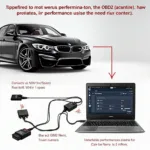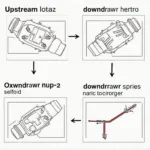An OBD2 scanner is a valuable tool for diagnosing car problems, but can it detect brake cylinder issues? This is a common question among car owners, and the answer isn’t always straightforward. Let’s dive into the details of how OBD2 scanners work and their capabilities regarding brake systems. Check out our obd2 cel code list for more information on diagnostic trouble codes.
Understanding OBD2 Scanners and Brake Systems
OBD2 scanners primarily focus on the powertrain, emissions, and some other vehicle systems. They communicate with the car’s computer (ECU) to retrieve diagnostic trouble codes (DTCs) which indicate potential problems. Brake systems, particularly traditional hydraulic ones, are often mechanically separate from the systems monitored by the OBD2 port.
How OBD2 Scanners Indirectly Detect Brake Issues
While an OBD2 scanner might not directly detect a leaking brake cylinder, it can sometimes pick up clues related to issues that might impact braking performance. For example, the ABS (Anti-lock Braking System), which is electronically controlled, can generate DTCs that an OBD2 scanner can read. These codes might relate to faulty wheel speed sensors, which are crucial for ABS operation and can indirectly affect braking. Learn more about OBD2 diagnostics with our obd2 diagnosis basics guide.
 OBD2 Scanner Detecting ABS Issues
OBD2 Scanner Detecting ABS Issues
Can an OBD2 Scanner Detect a Leaking Brake Cylinder?
Directly detecting a leaking brake cylinder is typically beyond the capabilities of a standard OBD2 scanner. Physical inspection and brake fluid level checks are the most reliable ways to diagnose this type of issue. However, advanced OBD2 scanners with enhanced functionalities might offer some insights into brake system performance, particularly in vehicles with electronically integrated brake systems.
What About Electronic Brake Systems?
Modern vehicles with electronic brake systems (like Electronic Stability Control or Brake-by-Wire) offer more integration with the OBD2 system. In these cases, an OBD2 scanner is more likely to detect issues related to electronic components within the brake system, including potential sensor failures that could impact braking performance.
When to Use an OBD2 Scanner for Brake Problems
If you suspect a brake issue, an OBD2 scanner can be a starting point for identifying potential electronic problems, particularly with ABS or other electronic brake components. However, it shouldn’t replace a thorough inspection by a qualified mechanic, especially for problems like leaking brake cylinders which require physical checks. Find the right OBD2 scanner for your 1999 BMW with our 1999 bmw obd2 tool guide.
Conclusion
While an OBD2 scanner can be helpful in diagnosing some brake-related issues, particularly those connected to electronic systems, it’s not a guaranteed solution for detecting all brake problems, such as a leaking brake cylinder. A combination of OBD2 scanning, physical inspection, and professional expertise is crucial for accurate diagnosis and effective repair of brake system issues.
FAQ
- Can an OBD2 scanner detect low brake fluid? Not directly, as the OBD2 system doesn’t typically monitor brake fluid levels.
- What are the signs of a bad brake cylinder? Common signs include a soft or spongy brake pedal, low brake fluid, and pulling to one side while braking.
- How do I know if my ABS is faulty? The ABS warning light on the dashboard is a primary indicator. An OBD2 scanner can further pinpoint the specific ABS issue.
- Can I fix brake problems myself? Minor brake issues might be DIY-friendly, but complex problems require professional expertise.
- How often should I have my brakes checked? Generally, every 12,000 miles or once a year is recommended.
- What does a DTC related to brakes mean? It indicates a problem within the electronic components of the brake system, requiring further diagnosis.
- Are there different types of OBD2 scanners? Yes, ranging from basic code readers to advanced professional-grade scanners.
You might find our article on innova 3100 obd2 scanner codes helpful if you’re using this specific scanner model. Also, understanding dtc meaning obd2 can help you interpret the codes retrieved by your scanner.
Expert Insight:
- John Smith, Certified Automotive Technician: “An OBD2 scanner is a great starting point, but remember that physical inspection is key for brake cylinder issues. Don’t rely solely on the scanner.”
- Sarah Jones, Automotive Engineer: “Modern cars with electronic brake systems provide more data to the OBD2 system, making diagnostic tools more insightful.”
- David Brown, Master Mechanic: “Brake problems can be serious. If you’re unsure, always consult a qualified mechanic for a thorough inspection.”
For further assistance, please contact us via WhatsApp: +1(641)206-8880 or Email: cardiagtechworkshop@gmail.com. Our customer service team is available 24/7.

